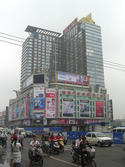The Republican victory in New York City’s ninth congressional district Sept. 13 — in a special election to replace disgraced Rep. Anthony Weiner — shocked the nation. But more important, it also could have signaled the end of the idea, propagated by Mayor Michael Bloomberg, of New York’s future as a “luxury product.” read more »
Economics
The Texas Story Is Real
Texas Governor Rick Perry entered the Republican presidential nomination race bragging about the job creation record of Texas during his term as his primary pitch to a nation starved for jobs. This triggered a flurry of debate on whether or not Texas is really all Perry claims for it. But while there is certainly nuance in numbers, and Texas doesn't win on every single measure, on the whole it seems indisputable that Texas did very, very well during the 2000s. read more »
Why the Eurozone Will Come Apart
Europe has been in the news a lot lately. One day it has a plan to, temporarily at least, deal with the debt problems of delinquent members, and markets climb. The next day there is a glitch and markets fall. What is going on here? Why are markets so spooky?
We’re witnessing what are almost surely the dying gasps of the European Union (EU) as we know it. By that, I mean the number of countries in the Euro’s common currency zone will decline. The markets are spooked, because how it happens will have huge economic consequences. read more »
The Die-Hard Recession Heads Off The Charts
"By 1970, the governments of the wealthy countries began to take it for granted that they had truly discovered the secret of cornucopia. Politicians of left and right alike believed that modern economic policy was able to keep economies expanding very fast -- and endlessly. That left only the congenial question of dividing up the new wealth that was being steadily generated."
Those words, from a Washington Post editorial more than twenty-five years ago, echoed the beliefs not only of read more »
Obama's Economic Trifecta: How The President Helped Kill Progressivism, Capitalism And Moderation
President Barack Obama‘s “pivot” on jobs this week shows that the president has finally — if belatedly — acknowledged the real misery caused by the Great Recession. However, it does not shed his complicity in the ever deepening employment crisis. Unemployment remains high, exceeding 9% — 16% if you include part-time workers. The percentage of adults in the workforce is bouncing near a 30-year low. read more »
The Golden State Is Crumbling
The recent announcement that California's unemployment again nudged up to 12 percent—second worst in the nation behind its evil twin, Nevada—should have come as a surprise but frankly did not. From the beginning of the recession, the Golden State has been stuck bringing up a humbled nation's rear and seems mired in that less-than-illustrious position. read more »
Supply of Tech Workers Greater Than Estimated Demand
CNBC reports the information technology (IT) sector is “where the jobs are.” And the Los Angeles Times writes that tech jobs in San Francisco are a “rare bright spot in the nation’s troubled economy.”
EMSI’s most current data, however, paints a slightly less rosy picture. read more »
- Login to post comments
Inside The Sinosphere
Avis Tang, a cool, well-dressed software company executive, lives on the glossy frontier of China’s global expansion. From his perch amid tower blocks of Tianfu Software Park on the outskirts of the Sichuan capital of Chengdu, the 48-year-old graduate of Taiwan’s National Institute of the Arts directs a team of Chinese software engineers who are developing computer games for his Beijing company, Perfect World Network Technology, for the Asian and world market. read more »
What Does Rick Perry Have To Do With Texas' Success?
You don’t have to like Rick Perry or his sometimes scary neo-confederate politics to admire what has been happening in Texas over the past decade. Rather than trashing the state in order to demean its governor, perhaps the mainstream media should be thinking about what the Lone Star’s success story means for the rest of the country. read more »
Who Lost the Middle Class?
Forty years from now, politicians, writers, and historians may struggle to understand how America, once the quintessential middle-class society, became as socially stratified as Europe or even Brazil. Should that dark scenario come to pass, they would do well to turn their attention first to New York City and New York State, which have been in the vanguard of middle-class decline.
It was in mid-1960s New York—under the leadership of a Barack Obama precursor, Hollywood-handsome John Lindsay—that the country’s first top-bottom political coalition emerged. In 1965, Gotham had more manufacturing jobs than any other city in the country. read more »






















